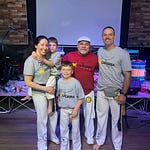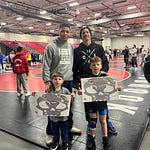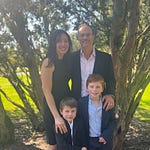🔥Welcome to Volume #00097!🔥
I’m Christian Champ. This is ☯️The Middle Way Newsletter ☯️. It is a place where I write, explore, share, and invite you along for the journey.
If you enjoy the newsletter, please share it with your friends.
🖍️Creating and Crafting Our Career Culture 🖍️
Why do some people manage their careers so well?
How can we follow in their footsteps by creating and crafting our career culture?
One day, our career is supposed to come together. We show up, do good work, and it all clicks like a puzzle.
Unfortunately, that is not how it works.
There isn't a conveyor belt that pulls us forward once we land on it, making life easy. The career doesn't mold itself into our masterpiece because we did the 10,000 hours.
There are victories, noise, setbacks and randomness.
We get trapped, feel stuck, and lose our agency to the market, our boss, or our company's ability to execute. Our ceiling feels too low, but we can't reach it. Or we stand on the roof, hitting our goals, but don't know what comes next.
Instead of thriving, we shuffle around, waiting for the weekends.
It’s not a conveyor belt pulling us forward; it's groundhog day. Occasionally we break through and get promoted or jump to a new position. Then it’s back to the baseline.
We feel like a sailboat waiting on the wind to blow.
We don't need to wait on external forces when we create and cultivate our career culture.
How can we do this?
#1 Learning Culture - First and Foremost
If we make learning the thing that we do, we can always find our bulls-eye. We get to make sure that there are two or three things we focus on improving.
By making learning the center of our culture, the north star is always in the sky.
We get to act like sponges, and life is better when our sponge fill up. Learning we feel accomplished and full. It gives us meaning by allowing us to fill up our sponges.
A bonus with learning is that we can always teach what we learn to others. Teaching lets us understand it better, help others, and spread our learning culture.
Powerful Learning Questions
What are you currently trying to learn?
What are you practicing?
What does the person you want to become need to learn?
#2 Self-Care Always
When we take care for ourselves, we create the environment to grow and thrive.
We do this by maximizing our rest and recovery. We eat right, put down devices and move our bodies.
We emphasize a culture of self-care, hitting the breaks when we need to rest and creating resilience for when we need to go the extra distance. We develop a culture of gratitude and grace. We start by being graceful to ourselves and sitting in gratitude.
When we create a culture of listening to ourselves, we connect deeply inside ourselves. Allowing us to listen and better connect with others.
Powerful Self-Care Questions
What do you need to do more of to create more energy?
What do you need to do less of to create more energy?
How do I show up daily with a gratitude and grace practice?
#3 Hone our Habits, Routines, and Actions
The easiest way a cultural flywheel gets created is through our repeated actions. What do we most care about, and how do we make sure that we make those actions repeatable?
It's the old Seth Godin comment of people like us do things like this. We need to make sure that our habits, routines, and actions are things that people like us do.
Powerful Habit Questions
What habits serve us and what habits fight against us?
What habits do we need to instill, and what do we need to let go of?
What do people like us do and are we doing it?
#4 Focus on the Flow
We need to set up a culture that unlocks flow for us. When we find flow, we do our best work and live our best lives.
We need to create the environment for finding our flow states. We need to protect these environments.
Flow happens when we let go and focus solely on the task at hand.
Powerful Flow Questions
What are my flow triggers?
How do we set up our flow triggers into our routines and habits?
How do we create the right environments for more flow?
#5 Playing Jazz
We find people to play in our band and find bands to play in. This exchange of energy, information, and ideas adds fuel to our career culture.
That is ultimately the career we want, where it feels like we are playing jazz with our band.
Our fellow players become our partners, teachers, coaches, mentors, and mentees. They keep us fresh and push us forward. We do the same for them.
We never are lone rangers; finding others is key to our career culture.
When we find them, we always want to show up and help make it better.
Powerful Jazz Questions
Who inspires and propels us forward?
Do we show up and provide value to our fellow band members?
How do we find more time with our band members?
Bottom Line
Our career culture is our neverending project.
We need to garden, grow and cultivate it. We get to use the help of others, but it is our job to do it well and do it right. When we do it right, we help not only ourselves but everyone around us.
It is similar to a garden, where we plant seeds and create daily routines around caring for them. As the garden grows, we change how we treat and care for it. Our career culture is ever-changing, just like we are ever-changing.
It all starts with being aware and treating it with care.
🧠Things to Think About🧠
Lenore Skenazy of Let Grow on What Kids Desperately Need
When asking middle schoolers what kind of club they wanted for after school, forty percent said a “play club.” It reminds parents that kids need play and that we all need more play.
Kids need to play as much as they need to eat and sleep and breathe. But it’s the one building block of childhood we have taken away. Accidentally! With the best of intentions! We love our kids so much that instead of giving them “just” play time, we offer enrichment: music, theater, sports, games, even science.
All of which are great! It’s just that in play, the kids are learning things that can’t be directly taught in a class. Like how to make a friend.
In America today, kids get an average of 4-7 minutes of unsupervised, unstructured play time outside.
If you have kids, are you making sure your kids get enough play?
If you have or don’t have kids, are you ensuring you get enough play? In what ways does play show up in your life? How can you get more of it?
The More Senior Your Job Title, The More You Need to Keep a Journal by HBR
Thinking about our career culture, one thing that helps us reflect on it and improve it is keeping a journal. This piece argues that a better job title means you need to journal, but a better frame is that we all need to journal.
It makes us better leaders, colleagues, partners, parents, and people.
There’s strong evidence that replaying events in our brain is essential to learning. While the brain records and holds what takes place in the moment, the learning from what one has gone through — that is, determining what is important and what lessons should be learned — happens after the fact during periods of quiet reflection.
Also, when we slow things down and reflect, we can be more creative about solving seemingly inscrutable problems.
This is the author’s guide to journaling, but we get to make it work for us. Yes, it takes time, but all things that help and serve us take time.
Journal entries should provide not only a record of what happened but how we reacted emotionally; writing it down brings a certain clarity that puts things in perspective. In other cases, it’s a form of mental rehearsal to prepare for particularly sensitive issues where there’s no one to talk with but yourself. Journals can also be the best way to think through big-bet decisions and test one’s logic.
📕Books to Read📕
Wild Problems: A Guide to Decisions that Define Us by Russ Roberts
Russ Roberts, the host of EconTalk, head of a research fellow at Stanford University's Hoover Institution, and president at Shalem College in Jerusalem, writes about the wicked wild problems we face.
Things like where to live, what jobs to do, who to marry, and whether we should have kids. Questions that we can’t answer because our answers can change us, and we don’t know anything about this future us.
The one-sentence summary of the question the book tries to answer… “If the important things are hard to measure, and the measurable things are misleading, what kind of decision framework is left?”
👇Click below to see the tweet storm about it.



🎧Things to Listen, See, and Watch 🎧
Vampires and Life Choices featuring Laurie Ann (L.A.) Paul on EconTalk
Why is it so hard to decide if we want to become vampires? This interview played a key role in Russ’ book Wild Problems.
According to L.A:
And if that decision is based on whether you want to become a vampire, which turns on what it would be like for you to become a vampire, then you have a problem. Because, if it's the kind of thing that you can only know and understand once you become a vampire, and if it's irreversible--this is a one-shot sort of thing--then you lack the kind of information that you need to make an informed decision. Or so I argue. That there's a problem here. Namely, that you don't know what it's like to live your life forward as a vampire. That's what you'd need to assign value to, in order to decide whether you want to have that life, or whether you want to keep the life that you have.
If you can't assign that possibility value, at least straightforwardly--value based on what it would be like for you to be a vampire--then your preferences are incomplete, or you haven't got the information that you need to make the choice in an informed way.
But, the problem is--well, there are several problems. But, one problem is that, with this kind of choice, it seems like it changes you in a very deep and fundamental way. It changes, in many ways, who you are.
And, sometimes, even the act of making the choice changes you in this irreversible way. Because it's just such a huge psychological thing to actually make the choice in the first place. And then you can have responsibility to others. For example, the child that you would create, etc.
And, what I say is that, we can find ourselves in certain situations where we can't know about something until we actually experience it. And that's partly just because of the way the brain works. Sometimes description and testimony, just can't give us what we need. We actually have to have the experience.
And a stock example in philosophy is like the experience of seeing red. You can't teach someone what it's like to see red just by describing what it's like to see red. They have to actually have seen it or at least seen colors very close to it, at best.
The way that I like to think about it is by recognizing that there might be a mistake in trying to kind of, you know, reduce the richness and quality and character of human experience to numbers, at least in certain contexts, even if let's say for policy reasons we have to do it in other kinds of situations, is that, what we need to do then is recognize that that's not the right thing to do, and develop alternative models and think about alternative ways of making decisions that can respect this, and just face the constraints that the world gives us.

💣Words of Wisdom💣
"Being a good coach is essential to being a good manager and leader. Coaching is no longer a specialty; you cannot be a good manager without being a good coach." (Eric Schmidt, Jonathan Rosenberg, Alan Eagle, Trillion Dollar Coach)
"Don't let the sea dictate where you go. You decide, and you keep rowing. Learn from your past, row in the present, and prepare for whatever comes your way. The most important thing is to keep on rowing." (Jon Gordon and P.J. Fleck, Row the Boat)
"To be prepared against surprise is to be trained. To be prepared for surprise is to be educated." (James Carse, Finite and Infinite Games)
“Mindfulness is an energy you can generate all day long through your practice. You can wash your dishes in mindfulness. You can cook your dinner in mindfulness. You can mop the floor in mindfulness." (Thich Nhat Hanh, No Mud, No Lotus)”
"As we age, we shouldn't accumulate more to represent ourselves but rather strip things away to find our true selves and thus, to find our second curve" (Arthur C. Brooks, From Strength to Strength)
"Quitting is fundamentally different from stopping. The latter happens all the time. Quitting happens once. Quitting means not starting again — and art is all about starting again." (David Bayles, Ted Orland, Art & Fear)
"A good rule of thumb, when you are first learning new concepts, is not to let things go untouched for longer than a day." (Barbara Oakley, A Mind for Numbers)
"If you know neither the enemy nor yourself, you will succumb in every battle." (Sun Tzu, The Art of War)
"Laugh if you will, but I’ve been spending my free time reading Lao-tsu and Chuang-tsu. The conclusion I’ve come to is that life is enjoyment. Without enjoyment, what use is there in living?” (Eiji Yoshikawa, Musashi)
"Every day is filled with opportunities to be amazed, surprised, enthralled-to experience the enchanting everyday. To stay eager. To be, in a word, alive." (Rob Walker, The Art of Noticing)
"The world changes according to the way people see it, and if you can alter, even by a millimeter, the way people look at reality, then you can change the world. - James Baldwin
“You boys going to get somewhere, or just going?” We didn’t understand his question, and it was a damned good question. - On the Road, Jack Kerouac
"Learning to lead yourself is the hardest part of becoming a leader. That’s one of the things new CEOs and aspiring entrepreneurs come to me for." (Jerry Colonna, Reboot)
🙏Thanks for Reading🙏
How can you better craft and create your career culture? What is working and what do you need to change?
Any thoughts or comments, please share!
Namaste,
Christian
We all did our part to get a win in the mummy-wrapping contest!














